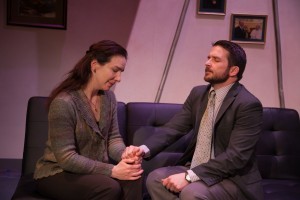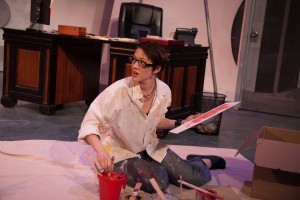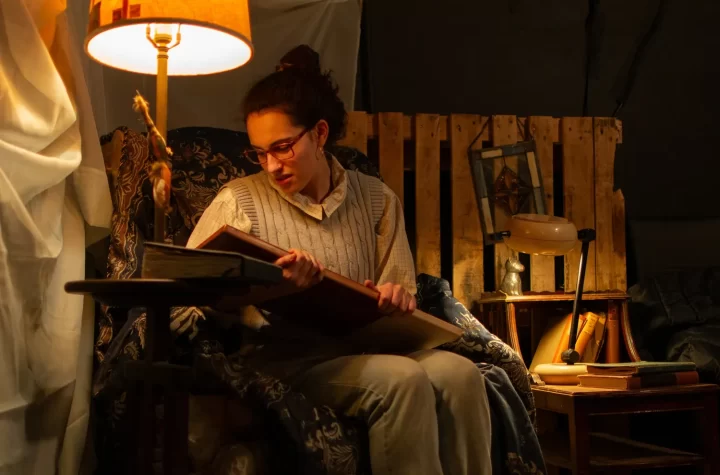
 Recommended *** In Penny Penniston’s play “Keys of The Kingdom” a fundamentalist minister, Ed (Don Bender), becomes convinced that a lesbian atheist, the painter Irene Hoff (Kate Black-Spence), has been chosen by God to paint the ceiling of his megachurch and gives her free artistic license to the astonishment of Ed’s personal assistant, Arthur (Brian Plocharczyk), Paige (McKenzie Chinn), Irene’s wife and manager, and most of all Irene herself.
Recommended *** In Penny Penniston’s play “Keys of The Kingdom” a fundamentalist minister, Ed (Don Bender), becomes convinced that a lesbian atheist, the painter Irene Hoff (Kate Black-Spence), has been chosen by God to paint the ceiling of his megachurch and gives her free artistic license to the astonishment of Ed’s personal assistant, Arthur (Brian Plocharczyk), Paige (McKenzie Chinn), Irene’s wife and manager, and most of all Irene herself.
Irene reluctantly accepts, and she and Arthur are forced to share a working space in which Irene, working high in the rafters, becomes privy to Arthur’s most intimate secrets. As she explains, “I’m invisible so it’s too easy for you to forget I’m up here, but I see and hear everything.” (Lest, we should forgot that this play is about God). She discovers that Arthur’s wife, Joann (Kathrynne Wolf), is pregnant, a contingency for which neither she, nor Arthur were prepared, and because there are medical problems associated with the pregnancy (though what they are and how severe are never articulated), she is reluctant to carry the baby term. And even while Ed, Arthur’s best friend, boss, and pastor, is organizing a pro-life march and lobbying for legislation, as he puts it, to “protect the unborn,” Joann announces to his horror that she wants an abortion.Irene is furious by Arthur’s refusal to give his consent, and in what truly seems like a character lapse, seeks revenge. She finds out (through an easy but unsavory and illegal method) that Arthur is dying of kidney failure from a former drug addiction. This vulnerability sets something off in Irene: as she and (the audience) learn of a crime he committed before his conversion with which, despite serving ten years in prison, he has never been fully allowed to come to terms. She pressures Ed, playing on his pride, to find him an organ donor match among his congregation. She seems surprised when Ed and the congregation attempt to do just that. 
Ed is surprised that Irene knows the stories of the bible. She is painting “Peter’s Denial”, at Arthur’s mysterious behest, and at one point recites Jesus’s response to “Peter’s Confession”: “Thou art Peter, and on this Rock I shall build my Church.” Irene has to explain to Ed that anybody who cares about art knows these stories whether or not they believe in them. Ed cannot understand how knowing them, she still refuses to believe. Irene responds by giving what is actually a very powerful and fairly apt, if highly unorthodox, description of Christian salvation history. Then things take a strange turn at the end of the first Act. What the Greeks called a “Deus Ex Machina,” or “God from Machine,” convinces Irene that she has heard angels and is the correct match for Arthur, and she fights to let her give him a kidney. She is also inspired to give a highly unconvincing interpretation of “Peter’s Denial” that persuades Arthur to see his wife’s predicament in a different light.
There are some serious weaknesses in Penniston’s script. Firstly, if the question of the Joann’s pregnancy is going to be one of the central plots, we need to know specifically what medical problems she faces. It is implied that Arthur’s former addiction puts the baby at risk for birth defects making adoption impossible but that is not how biology works. Moreover, the discourses surrounding abortion in the play are extreme and unsophisticated on both sides: a rehashing of old, emotional, and weak arguments, but perhaps the playwright was going for verisimilitude.
Still, it makes the play’s resolution of the issue even more unlikely: a new understanding is going to require a higher level of political discourse: the words “choice” and “life” do not change anybody’s mind. Also, a Deus Ex-Machina as a form of mystical experience in an otherwise realistic play is unconvincing after The Enlightenment. Arthur may not be able to articulate the Christian Faith as eloquently as Irene, despite ascribing to it, but his story is much more convincing as a modern conversion narrative. And then there is the question of why Irene should give an account of Christian Salvation history before her conversion that will probably move both the more moderate Christians and atheists in the audience before her mystical experience, and afterwards give an interpretation of Peter’s Denial that will make everyone who knows the story roll their eyes regardless of where they stand on religion? The infraction is so egregious that this question threatens to usurp the plot to become the play’s central mystery.
That said, Penniston’s script produces very high dramatic tension, comic humor, occasional lyrical dialogue, and sophisticated characters on which the director (Greg Werstler) and the actors are able to capitalize. Don Bender’s portrayal of the minister is a muted caricature, but that’s perfect. It makes his choice of Irene all the more mysterious. Irene’s and Arthur’s characters have the most depth, and the actors appropriately give very strong and nuanced performances keeping their struggles at the center of the play. Kate Black-Spence is convincing as an atheist and a lesbian, but she doesn’t reduce the character to either. She is also highly educated, articulate, artist, and there is a sensitivity and tenderness about her, especially in her scenes with Arthur, even before her mystical experience. She clearly loves Arthur by the end of the play, but the seeds are there even at the beginning and, as with the best performances, it is subtle and yet impossible to miss (She and McKenzie Chinn cultivate a sense of being in love in a very, familiar, domestic way with great success as well). In Brian Plocharczyk’s hands Arthur’s articulation of his faith early on seems very dogmatic, obsessive, and superficial, but as we learn his story, and he is forced into emotional intimacy with Irene, it becomes more sophisticated, authentic, and we see it produce positive behavior and feelings. The one performance I took issue with was Kathrynne Wolf as Joann. It’s not that she wasn’t able to execute the part convincingly. Her emotions, her feelings: they all seemed very real, but I never got a sense of what her relationship was to her husband’s church. She seemed less committed, and It was never clear if she was just distracted by the shock of the pregnancy or if didn’t mean as much to her as it did to her husband.
Anyhow, it gave the already problematic ending an ambiguity that wasn’t intended. Make-up and Costumes (Brenda Winstead) were excellent, making each of the actors extremely plausible in their role, but the set (Andrew Hildner) seemed a little amateur. Also “Ed” is not exactly the type of pastor we would expect to see smiling with the Dali Lama and Pope in prominently displayed photographs. It’s a megachurch where, at least during the course of the play, abortion and homosexuality are the only two social issues discussed. I doubt very much that the pastor would give any credence to the spiritual leadership of the Dali Lama or even the Bishop of Rome.
“Keys of the Kingdom” is being produced by Stage Left at the Theater Wit at located at 1229 W. Belmont Avenue. It runs Thursday through Saturday’s at 800 pm and Sundays at 300 pm until February 15th, 2014. Tickets are 20 to 30 dollars and are available online at www.theaterwit.org or by calling 773-975-8150. As you can see, there is a lot of activity on Belmont Avenue.
To see what others are saying, visit www.theatreinchicago.com, go to Review Round-up and click at “Keys Of The Kingdom”






More Stories
“The Berlin Diaries” reviewed by Julia W. Rath
“Legally Blonde: The Musical”
Teatro ZinZanni Chicago “Love Chaos and Dinner”.